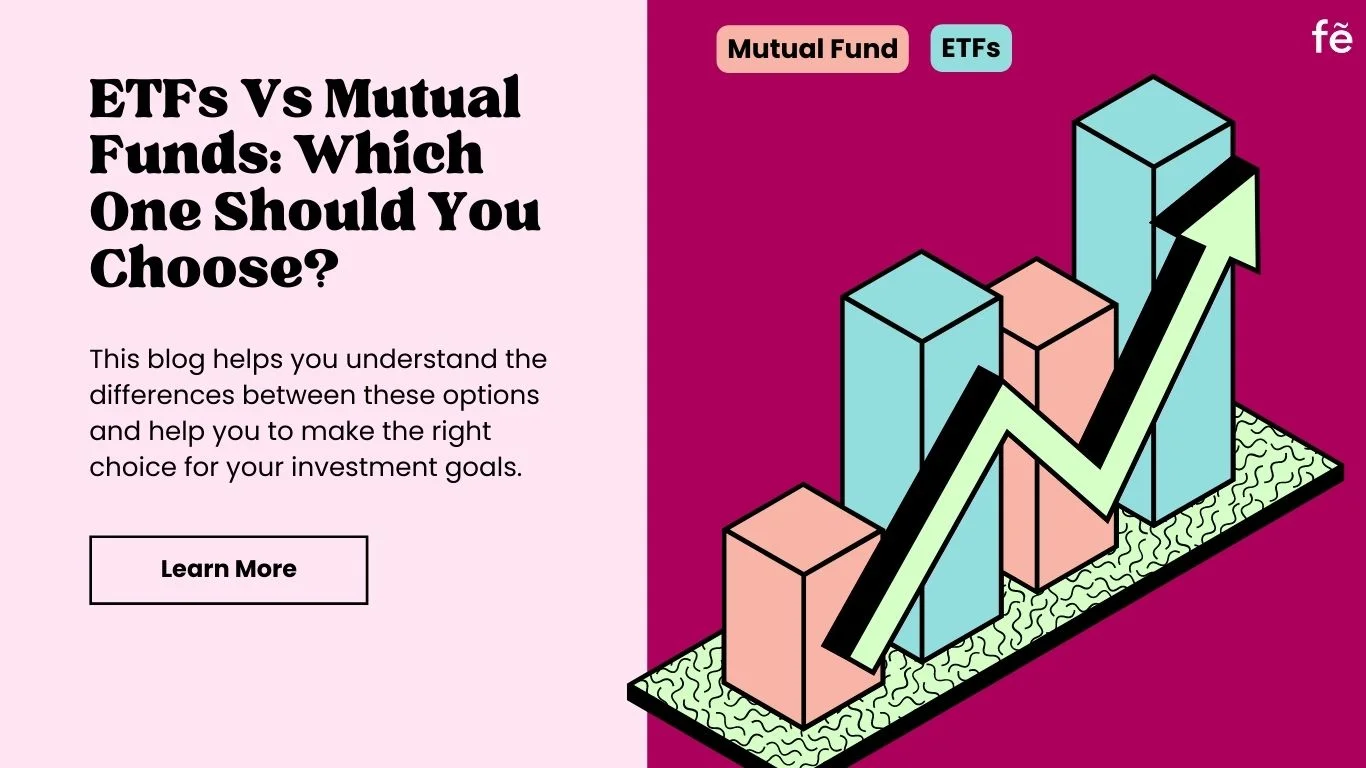
In the vast realm of investment opportunities, Exchange-Traded Funds (ETFs) and Mutual Funds have emerged as popular choices for investors seeking diversification, security and potential returns. While both options offer unique advantages, understanding their pros and cons is essential in making an informed decision.
In this blog, we will compare ETFs and Mutual Funds, exploring their characteristics, benefits, and considerations. By the end, you'll have a clearer perspective on which investment option aligns best with your financial goals and preferences.
Understanding The Difference: ETFs Vs Mutual Funds
Unveiling ETFs
Exchange-Traded Funds (ETFs) have gained significant popularity in recent years. Let's explore their key features:
Structure And Trading: ETFs are investment funds that trade like stocks on stock exchanges. This allows investors to buy or sell shares throughout the trading day at market prices, providing flexibility and liquidity.
Diversification: ETFs typically track a specific index, sector, or asset class, offering investors instant diversification within a single investment. They hold a basket of securities, such as stocks, bonds, or commodities, reflecting the underlying index or theme.
Transparency And Costs: ETFs disclose their holdings daily, enabling investors to see the portfolio composition. They also tend to have lower expense ratios than actively managed Mutual Funds, making them attractive for cost-conscious investors.
Minimize Capital Gains Distributions: ETFs utilize a unique creation and redemption process, allowing them to exchange securities with authorized participants. This process helps minimize capital gains distributions since ETFs can transfer securities without triggering taxable events.
Tax Management Tools: Some ETFs employ specific strategies, such as tax-loss harvesting, to offset gains with losses within the fund. This can enhance tax efficiency for ETF investors.
Unraveling Mutual Funds
Mutual Funds have long been a favored investment option for individuals. Let's examine their key characteristics:
Professional Management: Mutual Funds are actively managed by experienced fund managers who make investment decisions on behalf of the investors. The fund manager's expertise and research play a vital role in selecting stocks and managing the fund's performance.
Structure and Pricing: Mutual Funds are priced based on their Net Asset Value (NAV), calculated at the end of each trading day. Investors can buy or redeem fund units at the NAV price, ensuring a fair valuation for all investors.
Investment Options: Mutual Funds offer a wide array of choices, fullfil various risk profiles and investment objectives. From equity funds to debt funds, hybrid funds, and specialized sector funds, there's a Mutual Fund for almost every investment preference.
Perfect For SIP: In the world of investing, fractional shares have revolutionized access and affordability in the US stock market, granting investors the ability to purchase portions of a single share. However, in the Indian stock market, this opportunity is currently unavailable.
Given the nature of ETFs being traded like stocks, the consistent and uniform investment approach through SIP finds its true potential in mutual funds. By opting for mutual funds, investors can embrace a strategic consistency that aligns with their financial goals, allowing them to invest with a uniform amount over time. This unique advantage makes mutual funds a compelling choice over ETFs, empowering investors to navigate the market with steadfastness and purpose.
What To Consider While Choosing One Of Them?
To determine which investment option is better suited for you, consider the following factors:
Investment Risk and Timeframe: Assess your comfort with risk and consider the length of time you intend to invest for optimal decision-making. ETFs, with their potential for intraday trading, may be more suitable for short-term traders, while Mutual Funds may align better with long-term investment goals. The fluctuation is also lower in mutual funds compared to ETFs.
Cost and Expense Ratios: You must compare the expense ratios of ETFs and Mutual Funds. As expected, ETFs often have lower expense ratios, making them appealing to cost-conscious investors. However, remember to assess the overall value proposition, considering factors beyond just costs.
Investment Strategy and Diversification: Analyze the investment approaches of each option and determine their compatibility with your diversification objectives. ETFs provide exposure to broader markets or specific sectors, while Mutual Funds may offer active management and tailored investment approaches.
Summarize The Points In Table
| Characteristics | ETFs | Mutual Funds |
|---|---|---|
| Structure | Traded on exchanges like stocks | Bought and sold through fund companies |
| Pricing | Prices fluctuate throughout the day | Priced once a day (at the market close) |
| Cost | Generally have lower expense ratios | Expense ratios tend to be higher |
| Transparency | Holdings disclosed daily | Holdings disclosed periodically |
| Trading | Can be bought/sold at market price | Bought/sold at net asset value (NAV) |
| Flexibility | Can be traded intraday | Can be bought/sold only at market close |
| Tax Efficiency | Low capital gains distributions | Potential for capital gains distributions |
| Minimum Investment | Variable, may require a brokerage account | Set minimum investment amount |
| Investment Strategies | Passive (tracking indexes) or active | Can be passive or actively managed |
Conclusion
After exploring the characteristics, benefits, and considerations, you're now equipped with the knowledge to make an informed decision. Remember, the investment journey is personal, and there's no one-size-fits-all approach. It's essential to consider your own opinion in the decision-making process.
ETFs and Mutual Funds have their own values. If you are drawn to the flexibility of trading throughout the day, potential cost savings, and the ability to track specific indexes or themes, ETFs may be the path to explore. On the other hand, if you value professional management, a wide range of investment options, and a long-term approach, Mutual funds could align better with your aspirations.
Ultimately, the choice is yours. Remember to conduct thorough research, and consult with a financial advisor if needed.
Reference:



